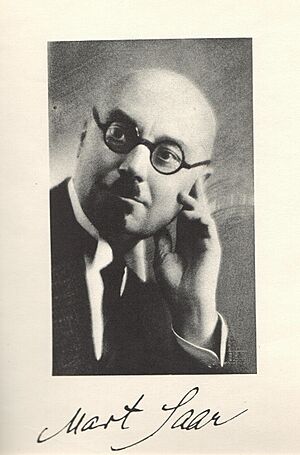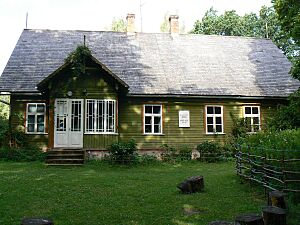Mart Saar facts for kids
Quick facts for kids
Mart Saar
|
|
|---|---|

Saar in 1932
|
|
| Born | 28 September 1882 Hüpassaare, Kreis Fellin, Livonian Governorate, Russian Empire
|
| Died | 28 October 1963 (aged 81) |
| Occupation | Composer, organist, collector of folk songs |
| Years active | 1911–1963 |
| Spouse(s) | Elise Saar (née Paalmann) Magda Elisabeth Saar (née Takk) |
Mart Saar (born September 28, 1882 – died October 28, 1963) was a famous Estonian musician. He was a talented composer, which means he wrote music. He was also an organist, playing the organ, and he collected many old folk songs.
Contents
Mart Saar's Early Life
Mart Saar was born in a small place called Hüpassaare, which is now part of Estonia. His father, Mihkel, worked with trees in the forest. His mother was Ann Saar. Mart was the oldest of four children. He had two brothers, Hans and Jaan, and a sister, Anna.
He went to school in his village at Kaansoo. Later, he attended the Suure-Jaani Parish school. His music teacher there was Joosep Kapp. Joosep Kapp's son, Artur Kapp, also became a very well-known Estonian composer. Mart's own father was a skilled organist and taught him music at home. This early start helped Mart become a great musician.
Mart Saar's Adult Life and Family
In 1901, Mart Saar left home to study music. He went to the Saint Petersburg Conservatory, a famous music school. He finished his studies in 1908 but decided to keep learning until 1911.
After finishing school, he became a music teacher in Tartu, a city in Estonia. Ten years later, in 1921, he moved to Tallinn, the capital of Estonia. There, he worked as a freelance composer and organist. This meant he wrote music and played the organ for a living. He loved his hometown and spent his summers in Hüpassaare.
Mart Saar married Elise Paalmann in 1915. They had two children, a daughter named Heli and a son named Ülo. Later, Mart and Elise separated. Mart then married Magda Elisabeth Takk, and they had a daughter named Tuuli.
Mart Saar's Music Career
When Mart Saar first started writing music, he was inspired by European music from the early 1800s.
As he grew older, Mart Saar began to mix Estonian folk music with newer, more modern sounds. He often added vocal parts to his longer musical pieces, called symphonies. Besides writing music, Saar also wrote the lyrics (words) for some of his songs. These lyrics often showed his deep love for Estonia and for nature. They also talked about how short life can be. People have said that his lyrics were similar to the poetry of famous Estonian poets like Anna Haava and Juhan Liiv.
Mart Saar's Famous Works
Mart Saar wrote many different kinds of music. Here are some of his well-known pieces:
Works for Mixed Chorus
These songs were written for a group of singers with both male and female voices.
- Põhjavaim (Northern Spirit)
- Seitse Sammeldunud Sängi (Seven Moss-Clad Tombs)
- Oh Kodumaa (Oh, My Homeland)
- Mis Sa Nutad, tammekene? (Why Are You Weeping, Oak Tree?)
- Kõver Kuuseke (Crooked Fir)
- Mälestus (A Memory)
- Allik (Wellspring)
Works for Male Choir
These songs were written for a group of male singers.
- Küll ma Laulaks (I Would Sing)
Works for Female Choir
This song was written for a group of female singers.
- Päikesele (To The Sun)
Solo Songs
These songs were meant to be sung by one person.
- Must Lind (Black Bird)
- Lauliku Talveüksindus (Singer's Winter Loneliness)
Piano Music
Mart Saar also wrote many pieces for the Piano.
- 20 Rahvaviisi (20 Folk Songs)
- Eesti Süidid (Estonian Suites)
- Prelüüd ja Fuuga G-duur (Prelude and Fugue in G)
- Humoresk (Humoresque)
- Skizze (Preludes)
 | William M. Jackson |
 | Juan E. Gilbert |
 | Neil deGrasse Tyson |


